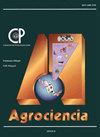植物提取物的植物化学特征和抗微生物活性对畜牧业具有重要意义
IF 0.5
4区 农林科学
Q4 AGRICULTURE, MULTIDISCIPLINARY
引用次数: 0
摘要
由致病菌引起的感染是畜牧部门经常出现的问题,给畜牧业造成重大的经济损失。主要策略之一包括抗生素治疗;然而,它的使用受到限制,因为致病菌对这些药物产生耐药性,这使得治疗微生物感染变得困难。因此,我们提出的假设是,来自墨西哥索诺拉州的本土植物乙醇提取物可以抑制与畜牧业常见感染相关的革兰氏(+)和革兰氏(-)致病菌的生长。目的是评估来自墨西哥索诺拉州的本土植物的植物化学和抗菌特性。本研究从索诺拉原生植物中提取了17种乙醇提取物,并采用琼脂扩散法和ATCC收集的参比菌微稀释技术对其抑菌活性进行了评价。采用分光光度法评估植物化学特征,实验设计完全随机化,每个处理有三个重复,置信度为95%。结果表明,黄豆、黄柳、白杨、黄花Ambrosia ambrosiides、sonorae Krameria sonorae、Leucaena leuceocephala提取物对单核增生李斯特菌ATCC 19115、金黄色葡萄球菌ATCC 25923、大肠埃希菌ATCC 25922、肠炎沙门氏菌ATCC 14028均有较好的抑菌作用(p≤0.05)。总多糖、黄酮和黄酮醇、黄酮和二氢黄酮醇、单宁和总绿原酸含量最高(p≤0.05)。因此,来自墨西哥索诺拉的植物提取物代表了控制革兰氏(+)和革兰氏(-)病原体的天然替代品,对畜牧业至关重要。本文章由计算机程序翻译,如有差异,请以英文原文为准。
PHYTOCHEMICAL PROFILE AND ANTIMICROBIAL ACTIVITY OF PLANT EXTRACTS AGAINST PATHOGENIC MICROORGANISMS OF IMPORTANCE TO THE LIVESTOCK INDUSTRY
Infections caused by pathogenic bacteria are a recurrent problem in the livestock sector, generating important economic losses in the livestock industry. One of the main strategies includes antibiotic therapy; however, its use is limited since pathogenic bacteria present resistance to these drugs, which makes treatment against microbial infections difficult. Therefore, the hypothesis proposed was that ethanolic extracts of native plants from the state of Sonora, Mexico, can inhibit the growth of Gram (+) and Gram (-) pathogenic bacteria related to common infections in the livestock industry. The objective was to evaluate the phytochemical and antimicrobial profile of native plants from the state of Sonora, Mexico. In this study, 17 ethanolic extracts were obtained from native plants of Sonora, and the antimicrobial activity was evaluated by the agar diffusion method and by the microdilution technique using reference bacteria from the ATCC collection. The phytochemical profile was evaluated by spectrophotometry and the experimental design used was completely randomized with three replicates per treatment at 95 % confidence. The results showed that extracts of Prosopis velutina, Ibervillea sonorae, Populus alba, Ambrosia ambrosioides, Krameria sonorae, and Leucaena leucocephala were effective in eliminating Listeria monocytogenes ATCC 19115, Staphylococcus aureus ATCC 25923, Escherichia coli ATCC 25922 and Salmonella enterica serovar Typhimurium ATCC 14028 (p≤ 0.05). In addition, these extracts presented the highest concentration of total polysaccharides, flavones and flavonols, flavanones and dihydroflavonols, tannins and total chlorogenic acid (p ≤ 0.05). Therefore, plant extracts from Sonora, Mexico, represent a natural alternative for the control of Gram (+) and Gram (-) pathogens of importance to the livestock industry.
求助全文
通过发布文献求助,成功后即可免费获取论文全文。
去求助
来源期刊

Agrociencia
农林科学-农业综合
CiteScore
0.50
自引率
33.30%
发文量
51
审稿时长
18-36 weeks
期刊介绍:
AGROCIENCIA is a scientific journal created and sponsored by the Colegio de Postgraduados. Its main objective is the publication and diffusion of agricultural, animal and forestry sciences research results from mexican and foreign scientists. All contributions are peer reviewed. Starting in the year 2000, AGROCIENCIA became a bimonthly and fully bilingual journal (Spanish and English versions in the same issue). Since 2007 appears every month and a half (eight issues per year). In addition to the printed issues, the full content is available in electronic format.
 求助内容:
求助内容: 应助结果提醒方式:
应助结果提醒方式:


